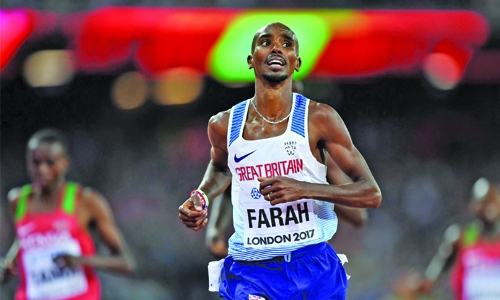Farah ready to mix it in the marathon
London : Whether months of 120 miles-a-week altitude training will be enough to transform Mo Farah into a world-class marathon runner will be revealed on the streets of London on Sunday but the switch already seems to have transformed his state of mind.
Farah has endured a prickly relationship with the media, suing one British journalist this year for repeating IAAF concerns over his blood passport values, but he seemed a changed man as he looked ahead to Sunday’s London Marathon.
“I’m more relaxed, the change from track has given me a massive boost and I’m enjoying it more than ever,” he told a news conference on Tuesday two hours after arriving from Ethiopia.
“On the track I’ve won most of the medals I could win so each year to motivate yourself gets more difficult. You have to find a new challenge, something that gets you out of bed.”
Having spent close to a decade lining up as the favourite to bag multiple world, Olympic and European titles over 5,000 and 10,000 metres, Farah goes into Sunday’s race not even ranked in the top 10.
His only previous marathon, at London in 2014, produced an eighth-placed finish in just over two hours eight minutes, not even good enough to challenge Steve Jones’s 33-year-old British record of 2:07:13.
Twelve men in Sunday’s field have run faster than Farah, with Kenenisa Bekele and Eliud Kipchoge, the second and third-fastest men in history, among those a full three minutes quicker and defending champion Daniel Wanjiru one of four with a 2:04-something to their names.
Olympic champion Kipchoge’s best of 2:03:05 equates to him finishing more than a mile ahead of Farah and the Briton was somewhat contradictory when discussing his approach to the race.
On the one hand he said “there’s only one way to run and that’s mixing it with the guys” but he also described the race as part of a learning process in which the British record was his aim.
Long-term goal
Farah’s long-term goal is the 2020 Olympics in marathon-mad Japan and the 35-year-old Briton knows he must improve dramatically to be in the medal mix.
“Through my years on the track I was learning and improving step by step and it’s the same in the marathon,” he said.
“That’s what it will take for me to medal in Tokyo. If I can do two marathons a year and learn from them, if everything goes well, if you’re strong and you learn, I think I’m of capable of 2:04 or 2:03 in the right race.”
Since switching to the marathon last year Farah is no longer coached by Alberto Salazar and his Nike Oregon project, which is still under investigation by U.S. anti-doping authorities.
Farah has previously said the split had nothing to do with accusations that Salazar bent and abused anti-doping rules and was because he wanted to return to England where he is now coached by Gary Lough, the husband and former coach of women’s marathon world record holder Paula Radcliffe.
Farah, who on Tuesday described Lough as a genius, is still working with strength coach Dave McHenry, who has never featured in the allegations being investigated by USADA but who has been involved with the Oregon Project for more than 10 years.
Farah said he had not spoken to Salazar and not seen McHenry since October.
“Through British Athletics he (McHenry) sent me a lifting and strength guide and that’s all,” Farah said.
Related Posts

